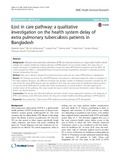| dc.contributor.author | Sarker, Malabika | |
| dc.contributor.author | Mohammad, Din | |
| dc.contributor.author | Paul, Sukanta | |
| dc.contributor.author | Akter, Rahima | |
| dc.contributor.author | Islam, Shayla | |
| dc.contributor.author | Biswas, Goutam | |
| dc.contributor.author | Hossain, Asheque | |
| dc.contributor.author | Islam, Akramul | |
| dc.date.accessioned | 2018-01-04T04:05:03Z | |
| dc.date.available | 2018-01-04T04:05:03Z | |
| dc.date.issued | 2017-03-28 | |
| dc.identifier.citation | Sarker, M., Mohammad, D., Paul, S., Akter, R., Islam, S., Biswas, G., … Islam, A. (2017). Lost in care pathway: a qualitative investigation on the health system delay of extra pulmonary tuberculosis patients in Bangladesh. BMC Health Services Research, 17(1), 1–10. https://doi.org/10.1186/s12913-017-2181-8 | en_US |
| dc.identifier.other | 14726963 | |
| dc.identifier.uri | http://hdl.handle.net/10361/8910 | |
| dc.description | This article was published in the BMC Infectious Diseases [© 2017 BMC Infectious Diseases] and the definite version is available at : https://doi.org/10.1186/s12913-017-2181-8 . The Journal's website is at: https://bmchealthservres.biomedcentral.com/articles/10.1186/s12913-017-2181-8 | en_US |
| dc.description.abstract | Background: Although extra pulmonary tuberculosis (EPTB) has long been known as a major public health concern
globally, the complex healthcare-seeking pathways of EPTB patients are not widely studied. This study aims to
explore the pattern of healthcare-seeking pathways of rural and urban EPTB patients registered with the BRAC TB
control programme. BRAC is a Bangladesh-based non-governmental organization dedicated to alleviating poverty
through empowering the poor.
Method: Data were collected through 60 in-depth interviews with rural and urban EPTB patients in Bangladesh.
Results: The findings reveal that the rural EPTB patients encountered a substantial diagnostic delay as compared to
the urban patients. However, the difference between the average number of healthcare providers consulted by the
rural verses the urban EPTB patients was not significant. This study also shows that the healthcare-seeking journey
of rural and urban EPTB patients usually starts either at pharmacies or private facilities. Through exploring the
detailed nature of the pathway, this study reveals the ways in which non-medical informants, mainly relatives and
friends, can benefit patients.
Conclusions: The private and informal healthcare providers should receive appropriate training on the diagnosis of
EPTB. Such training could effectively shorten the long and complex healthcare-seeking pathways of EPTB patients. | en_US |
| dc.language.iso | en | en_US |
| dc.publisher | BRAC Univeristy | en_US |
| dc.relation.uri | https://bmchealthservres.biomedcentral.com/articles/10.1186/s12913-017-2181-8 | |
| dc.subject | Extra pulmonary | en_US |
| dc.subject | Tuberculosis | en_US |
| dc.subject | ealthcare-seeking pathway | en_US |
| dc.subject | DOTS | en_US |
| dc.subject | Health | en_US |
| dc.title | Lost in care pathway: a qualitative investigation on the health system delay of extra pulmonary tuberculosis patients in Bangladesh | en_US |
| dc.type | Article | en_US |
| dc.contributor.department | James P Grant School of Public Health, BRAC University | |
| dc.eprint.version | Published | |
| dc.identifier.doi | https://doi.org/10.1186/s12913-017-2181-8 | |

